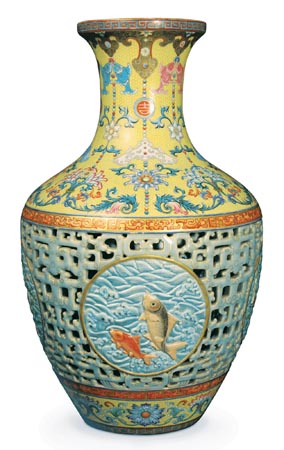For art's sake or patriotic duty
 |
|
This Qianlong-era vase was sold for 53 million pounds last week. |
The Qianlong vase sold for 53 million pounds is 16 inches tall, decorated with fish and was made around 1740. The porcelain is arranged in a lattice around the middle through which another vase is seen. It was probably taken out of China at the end of the Second Opium War in 1880, when the Summer Palace was ransacked, the UK-based Telegraph reported.
The Economist, a UK magazine, reported in December that the economic boom in China has prompted tycoons to become more enthusiastic about buying back relics.
The report said private collectors from the Chinese mainland have dominated the list of buyers at auctions in recent years. The magazine quoted Sotheby's in Hong Kong as saying that the auction house conducted business with 70 clients from the Chinese mainland and in 2004, there were just $10 million in transactions.
However, last year, the number of mainland clients increased to 195 and with $70 million in transactions.
In September 2007, Sotheby's in London sold animal heads cast in bronze, which formerly guarded a building in the Imperial Gardens but were plundered by British and French troops in 1860.
Just a collector
Macao gaming tycoon Stanley Ho bought the bronze horse head for HK$69.1 million ($8.84 million), and donated it to China.
However, Lü said not all tycoons buying relics are doing it out of patriotic duty.
"As far as I know, most people buying these relics are doing it to boost their personal collection and as an investment, not for love of the country," he said.
"It is just a personal behavior and too far fetched to be connected with patriotism."
An auction insider, who refused to be identified, told the Global Times that some collectors offer high prices for some works because they want to inflate the market price of similar types of artwork because that raises the value of their own collection.
Li Jianmin, an archeology expert at the Beijing-based Chinese Academy of Social Sciences, told people.com.cn earlier said such behavior sends the wrong message to the community.
"These relics were smuggled, stolen or looted in wars. If we offer huge sums of money to buy them back, it is legalizing these illegal activities," Li said.
 0
0 







Go to Forum >>0 Comments